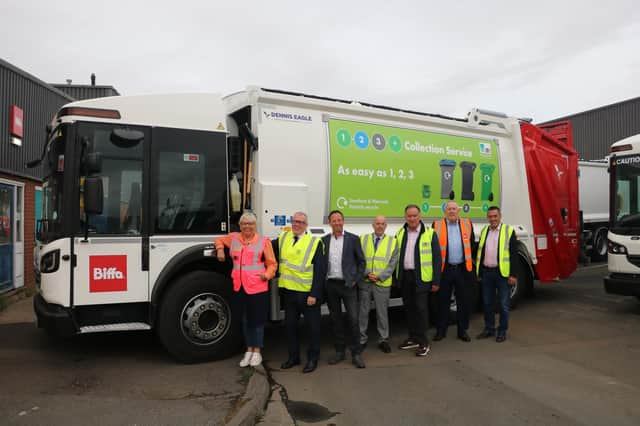Warwick-based manufacturer wins 'landmark' deal to supply bin collection vehicles - but council says it can’t afford to go electric


A Warwick-based manufacturer has won a 'landmark' deal to supply bin collection vehicles in the very neighbourhood in which they were built.
But Warwick District Council (WDC) has been criticised for not including any electric vehicles in its latest multi-million pound deal.
Advertisement
Hide AdAdvertisement
Hide AdWarwick and Stratford district councils’ £7.5million agreement with service provider Biffa includes 33 lorries and 16 food waste vehicles made by Dennis Eagle.
But none of the lorries are electric which has prompted questions from Warwick and Leamington MP Matt Western.
Dennis Eagle has supplied electric lorries to councils in Nottingham, Cambridge, London boroughs and, more recently, Exeter.
And Mr Western has questioned why WDC has not purchased any of the electric vehicles for itself.
Advertisement
Hide AdAdvertisement
Hide AdWDC said it looked into the possibility of buying electric vehicles but said it was 'impractical and too expensive'.
Mr Western said: “It is only right Dennis Eagle’s electric lorries are used for waste collection in the district where they are produced.
“But it is short sighted for regional authorities not to purchase any of the electric bin lorries which would massively reduce harmful emissions on our streets.
“It is right that WDC supports a crucial and historic Warwick and Leamington firm, but councillors need to be more serious about our transition to sustainable energy and honouring their own climate goals."
Advertisement
Hide AdAdvertisement
Hide AdThe contract with Biffa came into force on August 1 and will run until 2030.
It is the first time WDC has purchased a fleet of vehicles from Dennis Eagle.
The firm – which makes up 80 per cent of the UK market share for refuse collection vehicles – has a manufacturing base in Heathcote Way, Warwick, and around 10 service centres across the country.
Dennis Eagle’s general sales manager Ben Hoadley said: Dennis Eagle’s general sales manager Ben Hoadley said: “This is a landmark for us. These vehicles were built right here in Warwick. It’s totally fitting that they should be the vehicles providing collection services on their home territory.
Advertisement
Hide AdAdvertisement
Hide Ad“Of course, that’s not why they were chosen. They were simply the best vehicles to help Stratford and Warwick District Councils achieve their ambitious recycling targets and providing the best possible service for their customers.”
“And they all feature the Elite+ cab which was introduced earlier this year. It will go a long way to ensuring the safety of anyone near the vehicles. And it will also mean the drivers and crews are well-looked while helping them do their jobs quickly and efficiently.”
Warwick District Council’s portfolio holder for neighbourhood and leisure, Councillor Moira-Ann Grainger, said: “In order to improve our recycling rates and reduce the amount of waste going to landfill, we’ve set a high bar for our new 123+ service in terms of reliability and efficiency.
"It was therefore important for us to select vehicles that could fulfil our objectives, particularly as we are covering a much wider area and a number of households than previously.
Advertisement
Hide AdAdvertisement
Hide Ad"We are therefore delighted to have contracted local Warwick based company Dennis Eagle in whom we are confident will meet this brief.”
In response to Mr Western's concerns about the lack of electric vehicles, Alan Rhead, portfolio holder for climate change at Warwick District Council, said: “At the time the contract was let the council gave careful thought to the potential for an electric (or green hydrogen) fleet; neither were possible.
"Bearing in mind the vehicles cover the whole of south Warwickshire, including very rural areas, electric vehicles were shown to be impractical given the distances that needed to be covered, the limited vehicle range available, and the charging time required. In addition, electric vehicles were around £300,000 per vehicle more expensive (and we need over 30 vehicles), which when combined with operational limitations meant this option was rejected.
"Green Hydrogen was also given serious consideration. However, as we don’t currently have a local green hydrogen refuelling station, this could not be implemented for the start of the contract.
Advertisement
Hide AdAdvertisement
Hide AdThe council has agreed with the contractor that the carbon emissions must be reduced during the life of the contract. A key way we intend to do this is through introducing alternative fuels for the vehicles.
"We will proactively explore the potential for local green hydrogen refuelling; we will keep abreast of improvements in electric vehicle technology; and will research other low carbon alternative fuels."